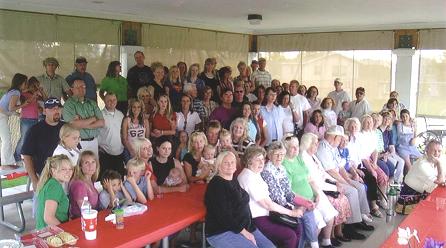
|
||
|
|

Guide to Writing a Life History
By Byron G. Mills
I Nephi, having been born of goodly parents... therefore I make a record of my
proceedings in my days. Nephi 1:1 Now it came to pass in the days when the Judges ruled, that there was a famine in the land, and a certain man of Bethlehem-Judah went to sojourn in the country of Moab, he, and his wife, and his two sons. Ruth 1:1
Now the word of the Lord came unto Jonah the son of Amattai saying, Arise, go to Nineveh,
that great city, and cry against it: for their wickedness is come before me.
In the land of the Chaldeans, at the residence of my father, I, Abraham saw that
it was needful for me to obtain another place of residence.
I have been induced to write this history, to disabuse the public mind, and to put
all inquirers after truth in possession of the facts, as they have transpired, in
relation both to myself and the church, so far as I have the facts in my possession.
What do all these scriptures have in common? They are personal histories of a person. Not all were prophets. Some seemed to lead an insignificant life at the time. The story was somehow preserved. Ruth is the story of a conversion. David was a King, and Jonah was a disobedient messenger. The Book of Esther has been questioned by some as to whether it should have been admitted to the cannon of scripture. It contains no mention of God. The book as a religious value contains a most striking illustration of God's overruling providence in history, and exhibiting a very high type of courage, loyalty, and patriotism. The importance of the individual and his history can not be measured in his life time, nor can the value to his descendants be seen. It has been commanded that all church members keep a personal history (See D&C 128:1-8). (Vs 7) "... The books spoken must be the books which contain the record of their works, and refer to the record which is kept on Earth. And the Book of Life, which is the record kept in Heaven. (Vs 8) "... Whatsoever you record on Earth shall be recorded in Heaven, and whatsoever you do not record on Earth shall not be recorded in Heaven." Can you leave the recording of your life to a Ward Clerk, or another individual? As worthy as most clerks are, the possibility of omission or error may occur. Many parts of your life are not known to the record keepers of the Church. You must be responsible for keeping your own records. Assembling your StoryThe following may be used for your story, or for those older and passed on you want to write a story for. Get an old shoe box for collecting documents, certificates, awards, and notes that you can gather up. This gives you a place to keep all the records. Make any additions to the list that may be important to the persons life, as time, religion and cultures may vary. Get a card file or loose leaf binder, and make a separate page (or card) for each of the points in the list below. The reason is to have room for entry of information. As you fill out the questions asked, and continue to go over the life history, many lost memories will come back to you. Write them in the correct section. The result is a chronologically accurate history will emerge. The following suggestions may help you to put your thoughts together and organize a life history. The list includes many pieces of information that you can include in a life history.
The above list will help you to think back and remember forgotten events. It will also help to organize the history in chronological order. Use the list as a checklist by which you can begin to research information. It is also helpful to talk with older living relatives to get pertinent information. In general you can follow these steps:
|
Needed
Family Photos Personal Histories |